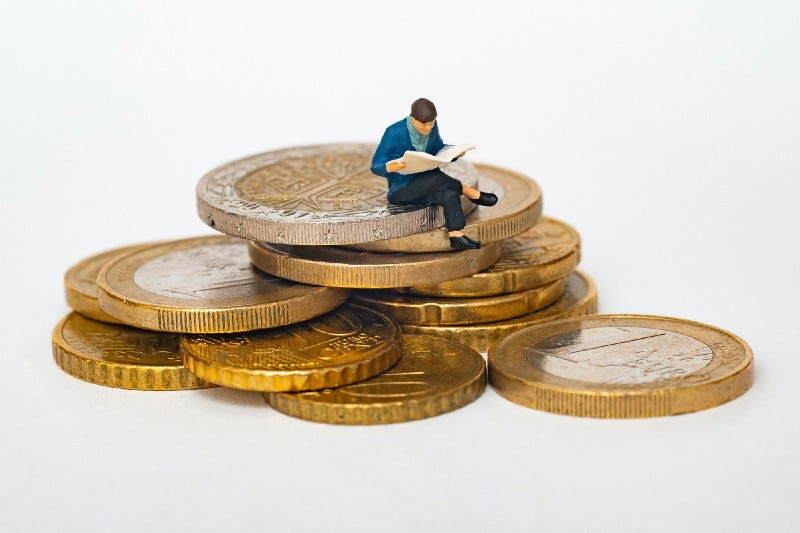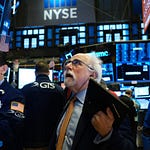Last week, I published an article entitled A Stock Market Crash Is Coming and Everyone Knows It. Rather than acknowledging that this market bubble is a giant scam and everyone is still trying to find ways to profit from it, my horribly greedy little readers all just asked the same question:
“So where should we invest our money, then?”
Obviously, not all my readers are horribly greedy little people.
Just 98% of you. ;)
We can’t help ourselves, can we? We’re so enculturated into this commodified, consumerist, individualist anti-culture that we can’t even fathom simply not playing the extraction game.
Yes, self-preservation is in our nature, but for most investors, the motive isn’t to protect truly-earned wealth — it’s to make an easy killing, even if it means a hard living for someone else.
Passive investors aside, I do sympathize with the hundreds of millions of people who are going to suffer in the next three years. Either the market will crash and wipe out half the market, or the Feds will continue to print so much new cash to avoid a crash that your savings will be worth half their current value.
Probably both.
When the bubble does burst — and it always bursts — tens of millions will lose homes. Tens of millions will lose jobs. Millions will go bankrupt. Thousands will commit suicide. Millions will never recover.
So where should we ethically and morally invest our money now, simply to protect it from the coming crash?
First, let’s start with what won’t work for people who are committed to longest-term widest-spread wellbeing for Earth and its inhabitants:
Gold
The gold standard was once useful, but as we enter the digital-first age, gold will play a smaller and smaller role in international finance until it’s as arcane an investment as seashells and beaver pelts. Plus, it costs money to store and protect gold, it isn’t easily tradeable, it doesn’t have a lot of real-world usefulness, the government can confiscate it at any time, it’s no longer a true hedge against inflation, and it’s not a productive asset.
But none of this matters to ethical people.
They avoid investing in shiny metal because gold is disastrous for the earth, it’s horrible for people, and it’s a pyramid scheme that only makes you rich if you can sell it to someone for more than you paid for it.
So gold is out.
Bonds
Bonds are garbage and basically pay negative yields versus real inflation.
But that doesn’t matter to ethical people.
They avoid bonds (and all other forms of debt) because they don’t want to play any part in the system of interest/usury that all major religions have unanimously been telling to ban for thousands of years.
They understand that interest wrecks lifelong havoc on societies because of the magic money multiplier effect, and they can’t make themselves complicit with a system that’s mathematically designed to enrich the rich and bankrupt the poor.
So bonds are out.
Commodities
Commodities prices have been soaring lately, but there are serious volatility issues, and as recently bankrupted British natural gas companies can attest, looming trade wars and supply chain challenges make this an extremely risky investment category.
But that doesn’t matter to ethical people.
They understand that human necessities like water and food and energy and heat shouldn’t be commodified in the first place. If the price of rice doubles because investors bid up the price, thousands of children literally starve to death. Commodities need to be de-commodified, because lives hang in the balance, and the market doesn’t care who lives and dies, so long as shareholders reap an ever-rising profit.
So commodities are out.
Real Estate
Residential real estate in most cities is probably 40–60% overpriced right now.
But that doesn’t matter to ethical people.
As with commodities, they understand that human shelter shouldn’t be commodified. Despite the nearly overwhelming temptation to hoard houses, become a land-lorder, and hop on predator apps like Airbnb, ethical people see that we’re at the start of a global shelter crisis that will only worsen if they decide to steal homeownership from others.
So real estate is out.
Pyramid schemes
The cryptocurrency and NFT markets have been on a $3 trillion tear these past two years, but they may have topped out, and you certainly need a huge stomach to handle the volatility.
But that doesn’t matter to ethical people.
They understand that Bitcoin is a Ponzi scheme, that all coins are $#itcoins, and that most NFTs are blatant fraud. They can’t in good conscience invest in an “asset” class that relies solely on eventually selling their digital files to someone for more than they paid, knowing that when the market crashes, those people are going to lose trillions of dollars.
So pyramid schemes are out.
Stocks
Most stocks are probably at least 200% overpriced right now.
But that doesn’t matter to ethical people.
Almost every publically-traded company is deeply problematic and is doing something that seriously hurts the planet or the poor. I want to be able to look my son in the eyes and say that I did no harm.
And on a macro level, ethical people are willing to be adults and admit the truth that every investor knows deep down in their bowels… that there’s no such thing as “putting your money to work for you.” You’re just using your capital (or credit) advantage to put someone else to work for you, flaying a profit off the back of someone else’s time, talent, energy, and effort.
This, of course, breaks the Golden Rule. Ethical people don’t want to be parasites on a living host. They want to actively contribute, not passively extract.
So stocks are out.
A quick recap
So far, we’ve established that a moral or ethical person can’t likely invest in:
Gold
Bonds
Real estate
Pyramid schemes
Stocks
Out, out, out, out, out.
But they still need to protect their money from institutional theft.
So unless I’m missing something, that basically leaves us with just three major investment options:
1. Pay down debts
I can hear the howls already:
“But debt is good if your interest rate is less than inflation!”
Look, I understand that millions of people are taking advantage of their corrupt government’s decision to devalue their currency by slow-paying their mortgage, but if growing wealthy by cratering the spending power of the poor is your idea of honoring mankind, Surviving Tomorrow probably just isn’t the right fit for you.
Ethical people understand that there are things that are more important than getting the absolute top return on investment — and the faster we pay off our debts, the sooner we are free. Freedom allows you to sleep better at night. To never worry about a rate hike, or job loss, or any accident or surprise that could make you lose your house.
The first good investment most people can make is to pay off their credit cards —saving 18.95% interest is the same thing as earning a 25+% ROI. Once you’ve killed your highest-bearing interest debts, work your way down until you don’t owe anyone anything except a debt of love.
2. Invest in your homestead
It’s time to stop thinking of our houses as boxes to sell to others, leaving us rich and the buyer with a lifetime of debt.
Instead, think of a house as a home, a citadel, and a homestead.
The goal here is economic self-sufficiency. Invest in insulation and water-saving technologies. Invest in solar. Invest in a micro-wind turbine if you live on a hill. Invest in micro-hydro if you have a creek or brook. Invest in geothermal. Build a rentable unit in your attic, basement, garden, garage, or backyard as a way to add housing stock to your city. Put in a garden or greenhouse or polytunnel. If you can work from home, ditch the city and buy a reasonably affordable yield-producing piece of land where you can have a rural farm, intentional community, and/or a sustainable timber forest.
Take your time. Start small — with high-ROI projects — and re-invest in your homestead until it pays for itself.
3. Invest in yourself
There are three ways you can attack this investment:
The first is to upgrade your education, get trained in a new skillset, find yourself a mentor, and start a sole proprietorship.
The second option is to invest in your community — IE, start a family business, co-operative, community-owned company, not-for-profit, for-benefit, or partnership with one or more competent entrepreneurs with complementary skillsets.
Together, build a truly great company that has zero debt, great cash flows, and large reserves so you can expand during a crash.
Do you know what we desperately need right now?
Local, sustainable, organic food producers.
Local, sustainable, organic hemp clothing manufacturers.
Geothermal, mini-wind turbine, and micro-hydro installers.
House renovators to transform aging units into ultra-efficient eco-homes.
Builders of owner-occupier-only houses, neighborhoods, and cities. (We need to build 750+ million houses in the next 28 years or three billion people will be living in slums in our lifetime.)
Experienced political operatives to fundraise and start new, pro-democracy, pro-sustainability, anti-corporate political parties.
Thirdly, investors can seek and acquire an already-established profit-producing small business that can survive a crash in the next 3–5 years. With so many Boomers retiring every single day, there are literally millions of opportunities to take over car mechanics, barbershops, restaurants, bakeries, greenhouses, and more. Many of them will even be willing to hold part of the loan.
The reality is that we need a generation to build companies that give instead of take, that contribute instead of extract, that cement communal stability instead of undermining its foundations.
Sadly, instead of living in a contribution economy, we now live in an extraction economy, where the wealthiest in society are those who contribute the very least — bankers, land-lorders, insurance brokers, corporate insiders, middle-man monopolists like Airbnb and Amazon and Uber, crypto speculators, Millennial grifters on Robinhood, and the elite shareholders who wield their capital advantage to siphon wealth away from the real builders of civilization. This is what happens when you let rent-seekers take over the global economy.
To turn things around, we must patently reject the powerful temptation to make any investment that profits from extraction.
In conclusion
Will the person who avoids unethical investments and only participates in commons-honoring investments end up wealthier in the end?
Almost certainly not.
But moral people don’t have any other choice. Their spirits and souls compel them to do what is right, regardless of what the unthinking (or uncaring) masses do.
It takes a person of deep character to look at their investments honestly and holistically, and do what is best not for themselves but for the world.
In the end, if everyone acted this way — if we invested in ourselves and each other in the right ways — we might all end up with a little less stuff, but we’ll have become more.
And the whole world would be richer for it.













